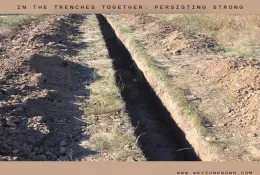Dragging one's Feet
 Overall, the idiom “dragging one’s feet” serves as a metaphor for slow progress or reluctance in moving forward, highlighting the need for motivation, determination, and a proactive approach to achieve goals effectively.
Overall, the idiom “dragging one’s feet” serves as a metaphor for slow progress or reluctance in moving forward, highlighting the need for motivation, determination, and a proactive approach to achieve goals effectively.
 Overall, the idiom “dragging one’s feet” serves as a metaphor for slow progress or reluctance in moving forward, highlighting the need for motivation, determination, and a proactive approach to achieve goals effectively.
Overall, the idiom “dragging one’s feet” serves as a metaphor for slow progress or reluctance in moving forward, highlighting the need for motivation, determination, and a proactive approach to achieve goals effectively.
 Against the grain refers to actions that challenge conventional norms. These unconventional approaches, often met with resistance, should be lauded for their potential to drive progress and innovation. Pioneers in various fields who nominate themselves to push boundaries often lead to groundbreaking advancements despite initial skepticism. Valuing and supporting such trailblazers can foster an environment of creativity and growth.
Against the grain refers to actions that challenge conventional norms. These unconventional approaches, often met with resistance, should be lauded for their potential to drive progress and innovation. Pioneers in various fields who nominate themselves to push boundaries often lead to groundbreaking advancements despite initial skepticism. Valuing and supporting such trailblazers can foster an environment of creativity and growth.
 A bolt from the blue refers to a sudden, unexpected event that catches everyone by surprise, similar to a lightning strike from a clear sky. Acknowledging these surprises allows for quicker adaptation and response. Such events often reveal hidden truths or opportunities, turning shocks into growth moments. By maintaining flexibility and preparing for the unexpected, one can avoid the negative impacts of these sudden occurrences.
A bolt from the blue refers to a sudden, unexpected event that catches everyone by surprise, similar to a lightning strike from a clear sky. Acknowledging these surprises allows for quicker adaptation and response. Such events often reveal hidden truths or opportunities, turning shocks into growth moments. By maintaining flexibility and preparing for the unexpected, one can avoid the negative impacts of these sudden occurrences.
 The phrase "once in a blue moon" describes something that happens very rarely, originating from the occurrence of a second full moon within a calendar month. It emphasizes events or experiences that are infrequent and noteworthy due to their rarity. Whether it's a rare celestial event or an unusual personal encounter, these moments often revive nostalgia and highlight the passage of time. Over time, the phrase has propagated into everyday language, symbolizing the value of unique occurrences amidst the routine of daily life.
The phrase "once in a blue moon" describes something that happens very rarely, originating from the occurrence of a second full moon within a calendar month. It emphasizes events or experiences that are infrequent and noteworthy due to their rarity. Whether it's a rare celestial event or an unusual personal encounter, these moments often revive nostalgia and highlight the passage of time. Over time, the phrase has propagated into everyday language, symbolizing the value of unique occurrences amidst the routine of daily life.
 The phrase "touch wood" is an idiom used to ward off bad luck or ensure good fortune continues, with origins in ancient traditions where people believed trees housed protective spirits. It has become an explicit part of modern language and is often used in a jovial manner during conversations. The act of touching wood serves as an improvised safeguard against jinxing oneself when discussing positive outcomes. This practice reflects a blend of hope, superstition, and cultural heritage, offering a ritualistic comfort.
The phrase "touch wood" is an idiom used to ward off bad luck or ensure good fortune continues, with origins in ancient traditions where people believed trees housed protective spirits. It has become an explicit part of modern language and is often used in a jovial manner during conversations. The act of touching wood serves as an improvised safeguard against jinxing oneself when discussing positive outcomes. This practice reflects a blend of hope, superstition, and cultural heritage, offering a ritualistic comfort.
 The idiom "up a creek without a paddle" describes being in a difficult situation with no apparent solution, likening it to being stranded on a river without a means to navigate. It underscores a state of helplessness and often implies a lack of preparation. For example, a project manager facing unexpected challenges without key resources would feel the pressure of impending deadlines and client expectations. Despite the difficulty, resourcefulness and resilience can help one find a way out of such predicaments.
The idiom "up a creek without a paddle" describes being in a difficult situation with no apparent solution, likening it to being stranded on a river without a means to navigate. It underscores a state of helplessness and often implies a lack of preparation. For example, a project manager facing unexpected challenges without key resources would feel the pressure of impending deadlines and client expectations. Despite the difficulty, resourcefulness and resilience can help one find a way out of such predicaments.
 When someone is downhearted, they feel sad and discouraged deep in their heart. It’s like carrying a heavy weight of gloom and low spirits due to setbacks or tough times. This feeling can stem from personal struggles, relationship issues, or challenging circumstances.
When someone is downhearted, they feel sad and discouraged deep in their heart. It’s like carrying a heavy weight of gloom and low spirits due to setbacks or tough times. This feeling can stem from personal struggles, relationship issues, or challenging circumstances.
 When someone says they’re “going through hell,” it means they’re facing really tough times, full of challenges and hardships. It’s like feeling overwhelmed by problems and struggling to see a way out. This expression conveys the depth of their struggles and the intensity of their difficult circumstances.
When someone says they’re “going through hell,” it means they’re facing really tough times, full of challenges and hardships. It’s like feeling overwhelmed by problems and struggling to see a way out. This expression conveys the depth of their struggles and the intensity of their difficult circumstances.
 "Rain on someone's parade" metaphorically describes the act of undermining another's joy or success with unintended negativity. It highlights how comments or actions, even well-intentioned ones, can inadvertently dampen someone's spirits or diminish their achievements. This expression underscores the importance of being mindful of the impact our words and attitudes can have on others, encouraging empathy and support in both personal and professional interactions. Ultimately, it reminds us to celebrate others' successes and milestones with positivity and encouragement.
"Rain on someone's parade" metaphorically describes the act of undermining another's joy or success with unintended negativity. It highlights how comments or actions, even well-intentioned ones, can inadvertently dampen someone's spirits or diminish their achievements. This expression underscores the importance of being mindful of the impact our words and attitudes can have on others, encouraging empathy and support in both personal and professional interactions. Ultimately, it reminds us to celebrate others' successes and milestones with positivity and encouragement.
 "Out of the woods" signifies escaping a period of difficulty or danger and entering a safer, more stable phase. This metaphor is often associated with recovery from illness, financial troubles, or personal crises. The relief experienced can lead to an enhancement of one’s perspective and a desire to adorn life with positive changes. Ultimately, it represents not just overcoming challenges but also embracing growth and renewal.
"Out of the woods" signifies escaping a period of difficulty or danger and entering a safer, more stable phase. This metaphor is often associated with recovery from illness, financial troubles, or personal crises. The relief experienced can lead to an enhancement of one’s perspective and a desire to adorn life with positive changes. Ultimately, it represents not just overcoming challenges but also embracing growth and renewal.
 Turning over a new leaf symbolizes a transformative and pivotal moment for personal growth, marked by adopting new behaviors or attitudes. This decision requires self-reflection, setting definite goals, and developing a positive mindset to overcome past mistakes. Embracing new opportunities and stepping out of comfort zones fosters resilience, adaptability, and the discovery of hidden talents. A cohesive plan can smooth this transition, leading to a more satisfying and enriched life.
Turning over a new leaf symbolizes a transformative and pivotal moment for personal growth, marked by adopting new behaviors or attitudes. This decision requires self-reflection, setting definite goals, and developing a positive mindset to overcome past mistakes. Embracing new opportunities and stepping out of comfort zones fosters resilience, adaptability, and the discovery of hidden talents. A cohesive plan can smooth this transition, leading to a more satisfying and enriched life.
 Overall, “at a low ebb” conveys the sense of being in a slump or facing adversity, where one’s spirits are low, and it’s challenging to muster enthusiasm or energy. It’s a way to describe a period of feeling downcast or dispirited.
Overall, “at a low ebb” conveys the sense of being in a slump or facing adversity, where one’s spirits are low, and it’s challenging to muster enthusiasm or energy. It’s a way to describe a period of feeling downcast or dispirited.
 Overall, when someone talks about a “heavy burden,” they are expressing the feeling of being weighed down by something challenging or demanding in their life. It’s a common way to convey the sense of being overwhelmed or struggling with a significant issue.
Overall, when someone talks about a “heavy burden,” they are expressing the feeling of being weighed down by something challenging or demanding in their life. It’s a common way to convey the sense of being overwhelmed or struggling with a significant issue.
 Overall, “In the trenches” captures the essence of being fully immersed in a demanding situation, highlighting the courage, perseverance, and dedication required to confront and conquer obstacles effectively. It symbolizes a willingness to endure hardships and stay committed to the fight, much like soldiers in the heat of battle.
Overall, “In the trenches” captures the essence of being fully immersed in a demanding situation, highlighting the courage, perseverance, and dedication required to confront and conquer obstacles effectively. It symbolizes a willingness to endure hardships and stay committed to the fight, much like soldiers in the heat of battle.
 In essence, “Life is a bed of thorns” encapsulates the idea that life’s path is not always easy, but by facing challenges with determination and courage, we can emerge stronger and more resilient individuals. It underscores the importance of resilience and the ability to endure hardships while striving for personal growth and fulfillment.
In essence, “Life is a bed of thorns” encapsulates the idea that life’s path is not always easy, but by facing challenges with determination and courage, we can emerge stronger and more resilient individuals. It underscores the importance of resilience and the ability to endure hardships while striving for personal growth and fulfillment.
 In summary, the idiom “on the rocks” conveys a sense of difficulty, instability, or trouble in a particular situation, implying that proactive measures may be needed to overcome the obstacles and restore stability.
In summary, the idiom “on the rocks” conveys a sense of difficulty, instability, or trouble in a particular situation, implying that proactive measures may be needed to overcome the obstacles and restore stability.